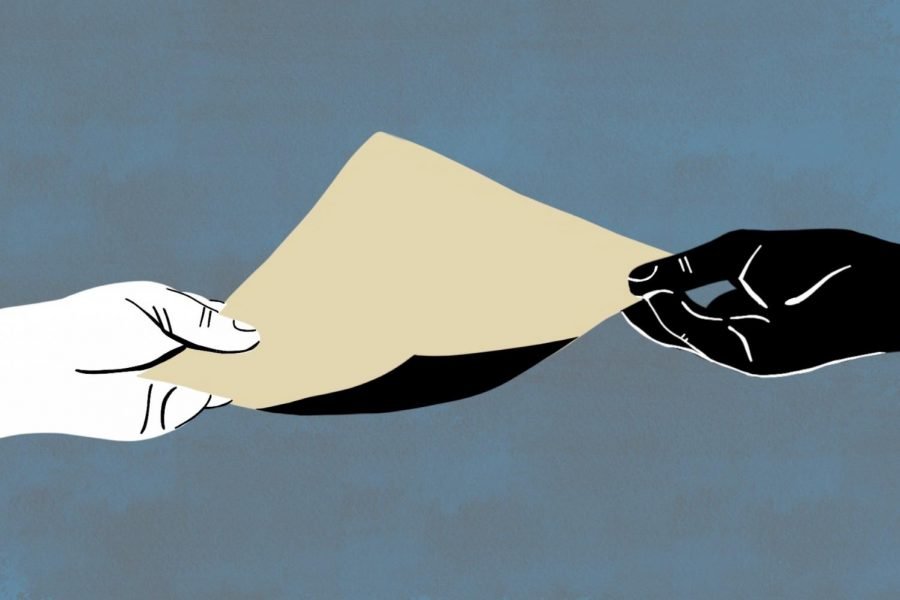National nonprofit offers cash payments to Evanston reparations qualifiers
Daily file illustration by Emma Ruck
A national nonprofit plans to show how cash payments could work as reparations by paying them in Evanston.
March 30, 2021
A national nonprofit is offering Evanston residents direct cash payments in an effort to prove it is an effective form of reparations. The program comes after the city approved the nation’s first reparations program for Black Americans, even though some residents oppose classifying the restorative housing plan as reparations.
Black residents who lived in Evanston between 1919 and 1969 or have a direct ancestor who lived in the city during that time, are eligible for the direct payments program. The criteria mirror those outlined by the city in its first use of reparations funds, known as the Restorative Housing Reparations program. The housing program includes those who can prove they experienced housing discrimination due to the city’s policies after 1969.
The Evanston Equitable Recovery Fund, funded by the Family Independence Initiative, will provide 25 Black Evanston residents with $300 a month for 10 months, with no strings attached on how to spend the funds — a direct contrast to the city’s program, which stipulates that the money can only be used for home purchase, improvement or mortgage assistance.
The organization publicly announced the fund last week, hours before City Council voted on its planned program. The city program will provide housing grants of up to $25,000 to 16 Black residents who either lived in Evanston between 1919 and 1969, are descendants of those residents or those who can prove they experienced housing discrimination due to the city’s policies after 1969.
The Family Independence Initiative’s focus on cash payments comes amid resident criticisms of the Restorative Housing Program. In the weeks leading up to the vote, community group Evanston Rejects Racist Reparations campaigned for the council to delay the vote or name the program something other than reparations.
The organization has offered similar programs in other cities, including Chicago and Oakland. Ebony Scott, the group Chicago Partnership Director, said recipients should be entrusted with the freedom to spend their reparations how they wish.
“The cash initiatives FII operates around the country demonstrate success,” Scott said in a statement published in the Evanston RoundTable. “People do better for themselves and their communities if they are given the funds they need.”
Members of Evanston’s Reparations Subcommittee, including Ald. Robin Rue Simmons (5th), Ald. Peter Braithwaite (2nd) and Ald. Ann Rainey (8th), said they appreciate Family Independence Initiative’s support for Evanston’s reparations initiative, and hope to work more with the organization in the future.
“This program allows us to pilot this benefit with the hopes to build and expand it in the future — including, we hope, a transition to unrestricted cash benefits for qualified residents,” Rue Simmons said in the RoundTable statement. “Repair is needed urgently in the Black community, and we will keep taking tangible steps to make that happen.”
Ald. Cicely Fleming (9th), the only alderman to vote against the Restorative Housing Program, told The Patch she applauds the organization for its effort to “respect an individual’s ability to make the best decisions on how to spend their money.”
During public comment at the March 22 City Council meeting where the city’s program was approved, E3R organizer Rose Cannon said she doesn’t benefit from the city’s program due to its housing focus.
“I don’t own property right now, and I’m not going to go get a 30-year fixed rate mortgage with my $25,000,” Cannon said. “That’s not what I want to do with that. We want cash payments.”
Residents can apply for the Evanston Equitable Recovery Fund on the Family Independence Initiative’s UpTogether website through April 5, according to the RoundTable statement. If more than 25 residents apply, recipients will be chosen at random.
Email: [email protected]
Twitter: @alexhairysun
Related Stories:
— City Council passes the country’s first reparations program for Black residents
— Ald. Fleming to vote against the Local Reparations Restorative Housing Program
— In Focus: With the eyes of a nation on Evanston, the first step of the historic reparations program faces pushback












